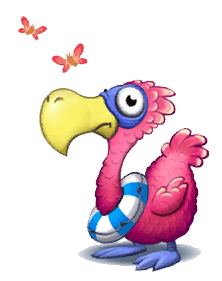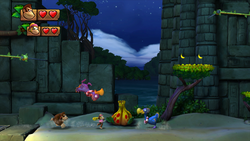Dozy: Difference between revisions
LinkTheLefty (talk | contribs) No edit summary |
LinkTheLefty (talk | contribs) No edit summary |
||
| Line 3: | Line 3: | ||
|first_appearance=''[[Donkey Kong Country: Tropical Freeze]]'' ([[Wii U]]) ([[List of games by date#2014|2014]]) | |first_appearance=''[[Donkey Kong Country: Tropical Freeze]]'' ([[Wii U]]) ([[List of games by date#2014|2014]]) | ||
|latest_appearance=''[[Donkey Kong Country: Tropical Freeze]]'' ([[Nintendo Switch]]) ([[List of games by date#2018|2018]]) | |latest_appearance=''[[Donkey Kong Country: Tropical Freeze]]'' ([[Nintendo Switch]]) ([[List of games by date#2018|2018]]) | ||
|subject_origin=[[Awk]] | |||
|variants=[[Sour Dodo]] | |variants=[[Sour Dodo]] | ||
|comparable=[[ | |comparable=[[Gnawty]] | ||
}} | }} | ||
'''Dozies'''<ref>von Esmarch, Nick, and Cory van Grier. ''Donkey Kong Country: Tropical Freeze'' PRIMA Official Game Guide. Page 12.</ref> are uncommon enemies appearing in ''[[Donkey Kong Country: Tropical Freeze]]'' and its Nintendo Switch [[Donkey Kong Country: Tropical Freeze (Nintendo Switch)|port]]. They appear in many areas of the [[Lost Mangroves]], although a flock of Dozies and [[Sour Dodo]]s can be spotted relaxing on a small isle in the background of [[Mangrove Cove]]. Dozies resemble small, pink {{wp|dodo|dodo bird}}s that don a swim tube around their necks. Their head plumage, as well as their wing and rear plumage, is composed of feathers with orange-colored edges. They also have indigo-colored feet. They have a more aggressive counterpart called the Sour Dodo. | '''Dozies'''<ref>von Esmarch, Nick, and Cory van Grier. ''Donkey Kong Country: Tropical Freeze'' PRIMA Official Game Guide. Page 12.</ref> are uncommon enemies appearing in ''[[Donkey Kong Country: Tropical Freeze]]'' and its Nintendo Switch [[Donkey Kong Country: Tropical Freeze (Nintendo Switch)|port]]. They appear in many areas of the [[Lost Mangroves]], although a flock of Dozies and [[Sour Dodo]]s can be spotted relaxing on a small isle in the background of [[Mangrove Cove]]. Dozies resemble small, pink {{wp|dodo|dodo bird}}s that don a swim tube around their necks. Their head plumage, as well as their wing and rear plumage, is composed of feathers with orange-colored edges. They also have indigo-colored feet. They have a more aggressive counterpart called the Sour Dodo. | ||
Revision as of 08:36, August 16, 2023
| Dozy | |||
|---|---|---|---|

| |||
| First appearance | Donkey Kong Country: Tropical Freeze (Wii U) (2014) | ||
| Latest appearance | Donkey Kong Country: Tropical Freeze (Nintendo Switch) (2018) | ||
| Subject origin | Awk | ||
| |||
| |||
Dozies[1] are uncommon enemies appearing in Donkey Kong Country: Tropical Freeze and its Nintendo Switch port. They appear in many areas of the Lost Mangroves, although a flock of Dozies and Sour Dodos can be spotted relaxing on a small isle in the background of Mangrove Cove. Dozies resemble small, pink dodo birds that don a swim tube around their necks. Their head plumage, as well as their wing and rear plumage, is composed of feathers with orange-colored edges. They also have indigo-colored feet. They have a more aggressive counterpart called the Sour Dodo.

Dozies are generic enemies that do not actively attack the Kongs. Their behaviors are comparable to Awks from Donkey Kong Country Returns, as Dozies walk back and forth, but peck and injure the Kongs upon simply bumping with them, draining one of their heart points. The player can defeat a Dozy using any means of attack, such as a jump, a Roll Attack, or by throwing an object, such as a barrel. A Ground Pound can stun them for a brief moment if the Kongs stand close enough to them. They can also be stunned if shot by Diddy, Dixie, or Cranky's popguns.
Names in other languages
| Language | Name | Meaning | Notes |
|---|---|---|---|
| Japanese | バーディー[2] Bādī |
Birdy |